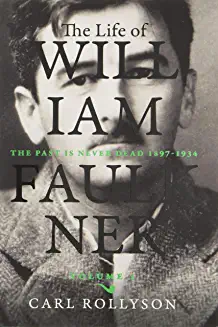
Did you know William Faulkner, the Mississippi native and famous American novelist, bragged to his friends and acquaintances he had been wounded in battle during World War I when, in fact, he never saw combat.
Did you know that the Nobel-winning author was an avid golfer who loved to spend hours searching for lost golf balls? Or that he was the worst campus postmaster in the history of Ole Miss?
These are just a few of the interesting new facts I discovered recently after reading Carl Rollyson’s new book, The Life of William Faulkner, The Past is Never Dead 1897-1934, Volume 1, and conducting a sit-down interview with the author.
Rollyson is Professor Emeritus at Baruch College, The City University of New York. He has published many biographies of celebrities and literary figures, including Walter Brennan, Marilyn Monroe, Sylvia Plath, and Norman Mailer. His article and reviews have appeared in many national publications.
Now back to Faulkner’s military shenanigans.
In June of 1918, after Faulkner’s high school sweetheart married another man, “Bill,” as his friends called him, deserted his home town Oxford, Mississippi, then went to Canada and joined the Royal Canadian Air Force.
To enlist, he used a forged letter of reference and, once he was signed up, traveled to Toronto to begin basic training. Although he had hoped to learn to fly a plane, most of his time was spent mopping floors, peeling potatoes and washing dishes.
Bill loved military life. When one officer saw him busily digging a trench with great concentration, he ordered the recruit to snap to attention.
“What are you doing there?” the officer said.
“Learning to fly, Sir!” Faulkner replied.
When the war ended before his training was over, Faulkner returned to Oxford in December 1918 looking every inch the war hero. He was wearing a spiffy RAF officer’s uniform, carrying a swagger stick and hobbling on a cane.
When friends and relatives asked about the injury, he launched into wild tales about being engaged in frenzied aerial dogfights with enemy planes. The truth was that Faulkner had never received cockpit training or had ever flown a plane.
***
Even as a youngster, Faulkner loved the idea of flying. As an eleven-year-old playing in his back yard, he put together a model plane out of several pieces of junk. Once finished, it was ready for a test flight. With the help of two friends, a disabled coachman and a one-armed yard man, the three heaved the plane into the sky.
The craft, of course, promptly crashed and broke into pieces.
Faulkner cried like a little baby.
***
Bill loved to drink whiskey and often played being drunk, remembered one long-time friend. That way he could act out his frustrations, evade responsibility for his actions or dramatize the despair of being the returning veteran and lovesick poet. Oftentimes, family members indulged Faulkner and these antics.
Once when he was on a drunk, his mother Maud diluted his whiskey with iced tea until there was little or no alcohol content. That afternoon, while her son was still drunk, she asked if it wasn’t time for him to go to work.
“I can’t,” said Bill. “I’m drunk.”
“If you are, you’re drunk on iced tea. That’s all you’ve had for the last twelve hours.”
“Then I believe I’ll get up and go to work,” he replied.
***
From childhood, Faulkner was always concerned about his appearance. At an early age, his mother made him wear a back brace to further straighten his already perfect posture.
In one of his letters home he wrote:
“I might be ragged and full of fleas, but my pants, thank God, don’t bag at the knees.”
***
In the fall of 1921, Faulkner told a friend he was going to New York and “be famous overnight.”
Two weeks later, he wrote the same friend: “Oh, yes. I have already stopped traffic in the streets; fame, in fact, has alighted early upon my furrowed brow. A traffic cop gave me a talking-to because I ignored a stop sign that caused a trolley car to almost run over his feet while another brushed the skirts of his coat.”
***
Bill was an adept golfer and was often seen on the course near his home helping the groundskeeper, Thomas Clark, work on improving the course.
Clark appreciated the assistance, but suspected Bill wanted to retrieve lost golf balls in the course’s three water hazards to “replenish his own slender stock.”
“Nothing thrilled Bill more than finding a golf ball some errant golfer had lost.”
His golf course experiences probably provided material for the golfing scenes in the novel The Sound and the Fury, a work many consider his greatest.
***
In the late summer of 1923, Faulkner took a job as campus postmaster at the University of Mississippi. Although he signed on to work, he spent most of his time writing poems for his book, The Marble Faun.
In September of 1924, Postal Inspector Mark Webster had three pages of complaints against him. These included: failure to deliver mail, mishandling stamp money, failure to attend promptly to customers at P.O. window and an overall lackadaisical attitude. Only days later, he was fired.
Years later, after The Marble Faun was printed, Faulkner sent a signed copy to Webster, noting in the inscription:
“It is to you that I owe extrication from a very unpleasant situation.”
Bill was more than ready to leave the post office job.
***
In 1923, Faulkner went to New Orleans to live in the French Quarter and hobnob with the South’s so-called literary elite. When he first arrived, he became close friends with author Sherwood Anderson.
One night, Faulkner arrived at Anderson’s home wearing a heavy, bulky overcoat with the sides bulging out all around. Instantly, Anderson wondered what the problem was.
“I want to leave some things with you,” Faulkner said.
“What do you want to leave?”
Faulkner pulled back the heavy overcoat to reveal six one-gallon jugs of moonshine.
“You can leave them if you’ll give me one,” Anderson said.
Thanks for listening… and keep smiling!
Audrey McCarver. August 19, 2022


